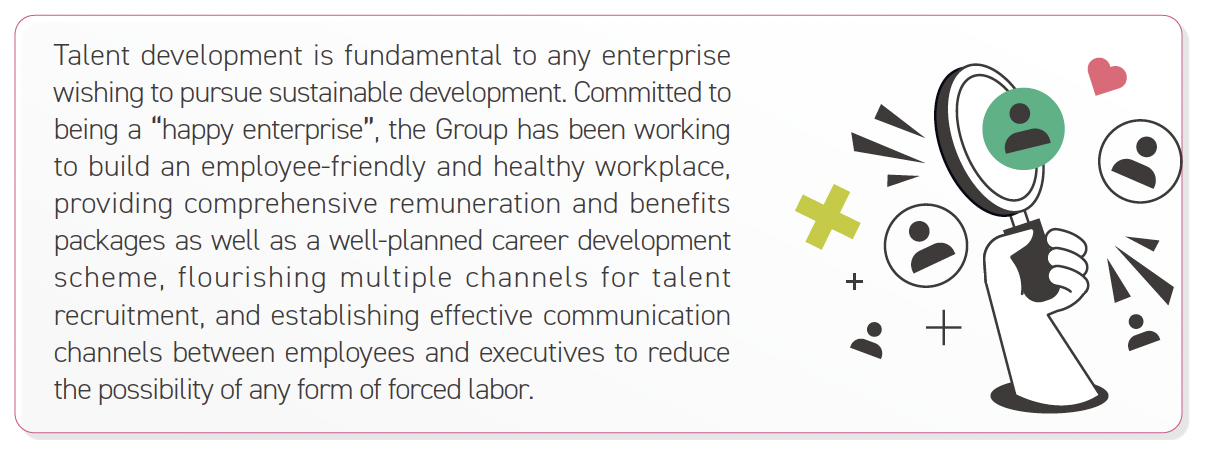
Talent Recruitment
Talent Recruitment Strategy
In response to rapid changes in the financial environment and the vigorous development of digital banking, the Group is working to cultivate talents and improve competitiveness, actively recruiting elites in the field of finance based on the needs of each unit through open recruitment, campus recruitment, and industry-academia collaborations. Additionally, to keep up with the digital era and break traditional stereotypes regarding state-owned financial institutions, the Group actively makes use of new media, conducting digital marketing from multiple angles, including social media curation, content marketing, ad placement, and search engine optimization (SEO). As of 2024, TCFHC has been selected as a constituent of the “Taiwan Employment Creation 99 Index” for 8 consecutive years, and has won the “Happy Enterprise in the Financial Management and Consulting Industry Gold Award” for 5 consecutive years, demonstrating that its efforts to value talent and improve employee welfare have been widely recognized.
To foster a culture of inclusivity and diversity, when recruiting new employees, the Company not only prohibits the hiring of employees under the age of 16 (child labor), but also ensures that no discrimination occurs based on race, religion, skin color, political affiliation, age, gender, sexual orientation, marital status, or physical or mental disability. Discrimination in employment is absolutely prohibited. In 2024, the Group recruited 593 new employees, accounting for 6.13% of all employees at the end of the year, with approximately 58% of new employees being under the age of 30, demonstrating the effectiveness of the Group’s recruitment policy reforms in recent years.
Upon reviewing the distribution of new employees over the past 4 years, the proportion of each gender has never been less than 1/3. Additionally, the salary determination for new employees, regardless of gender, follows a 1:1 ratio, with no differences in starting salaries for the same position. This reflects the implementation of a policy of equal pay for equal work and a recruitment policy free from gender discrimination.
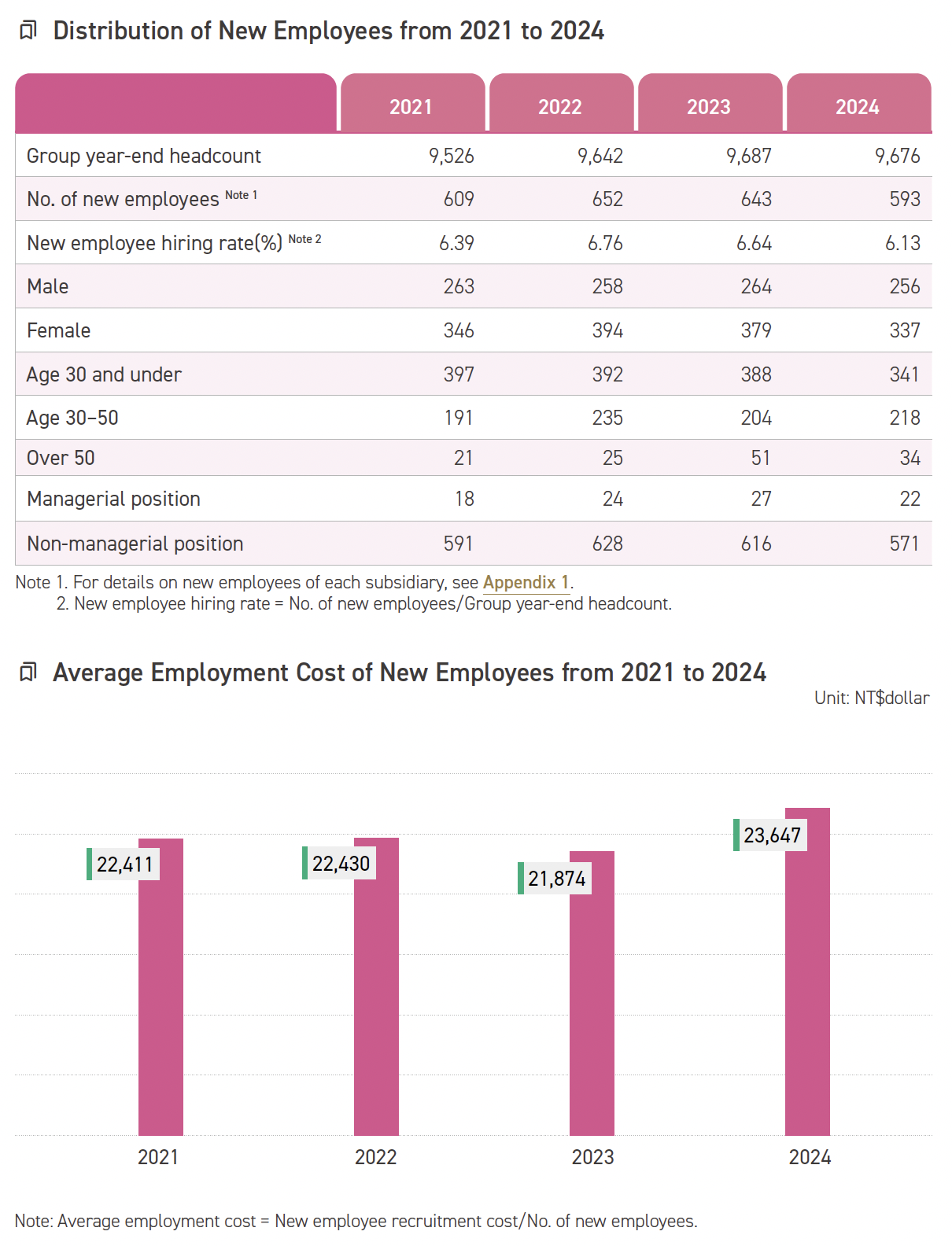
In response to the development of sustainable finance and the fintech trend, TCFHC, besides actively recruiting professional digital-technology talents to improve the Group’s digital-banking literacy, strengthened internal workforce transformation training, improved bilingual proficiency, nurtured talent to connect with the world, and broadened employees’ international horizons so that they can directly fill vacancies. These internal and external measures work in tandem to improve the Group’s overall competitiveness.
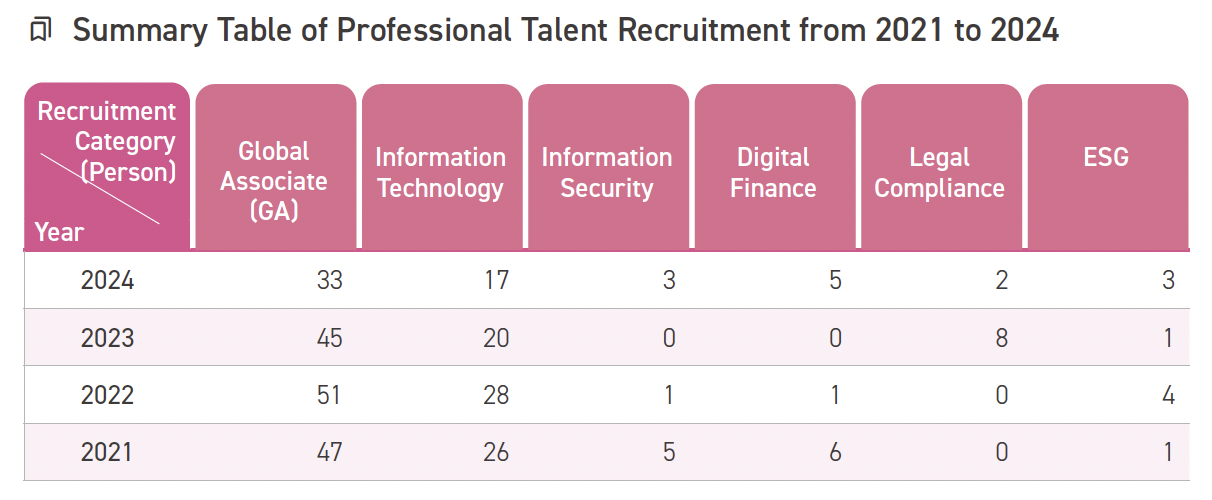
In 2024, the employee turnover rate for the TCFHC Group was approximately 6.42%. After excluding 255 employees who retired upon reaching the retirement age or who applied for retirement, the turnover rate was 3.78%. Although the employee turnover rate has slightly increased over the past 4 years, it remains relatively low compared to the average turnover rate of over 20% for the banking sector as per the 104 Job Bank. Furthermore, the retention rate of newly hired employees in 2024 was 83.64%, meaning only 16.36% resigned within the year of employment, demonstrating that TCFHC’s employment environment is still highly favored by most employees.
In addition, TCFHC places high importance on employee rights, with the involuntary turnover rate consistently below 1%. Even in cases where business closure, transfer, or changes in business nature necessitate workforce reduction and no suitable positions are available for redeployment, or when an employee is unable to perform their duties, the termination of the employment contract is carried out in accordance with the Company’s “Work Rules”, as well as relevant laws such as the “Labor Standards Act”, “Employment Service Act”, and the “Act for Worker Protection of Mass Redundancy”. Employees are provided with a 10 to 30-day notice period based on their years of service, and the competent authorities are notified. The Company fulfills its legal obligations by properly providing and notifying severance notice, offering paid job-seeking leave to give severed employees time to prepare for finding new employment. By upholding the principle of integrity, the Company ensures the termination of the labor contract is carried out in a legal and proper manner, while safeguarding the employees’ rightful entitlements. In recent years, to meet business needs, TCB has established a short-term re-employment system for retired personnel to assist with talent development and business continuity at branches.
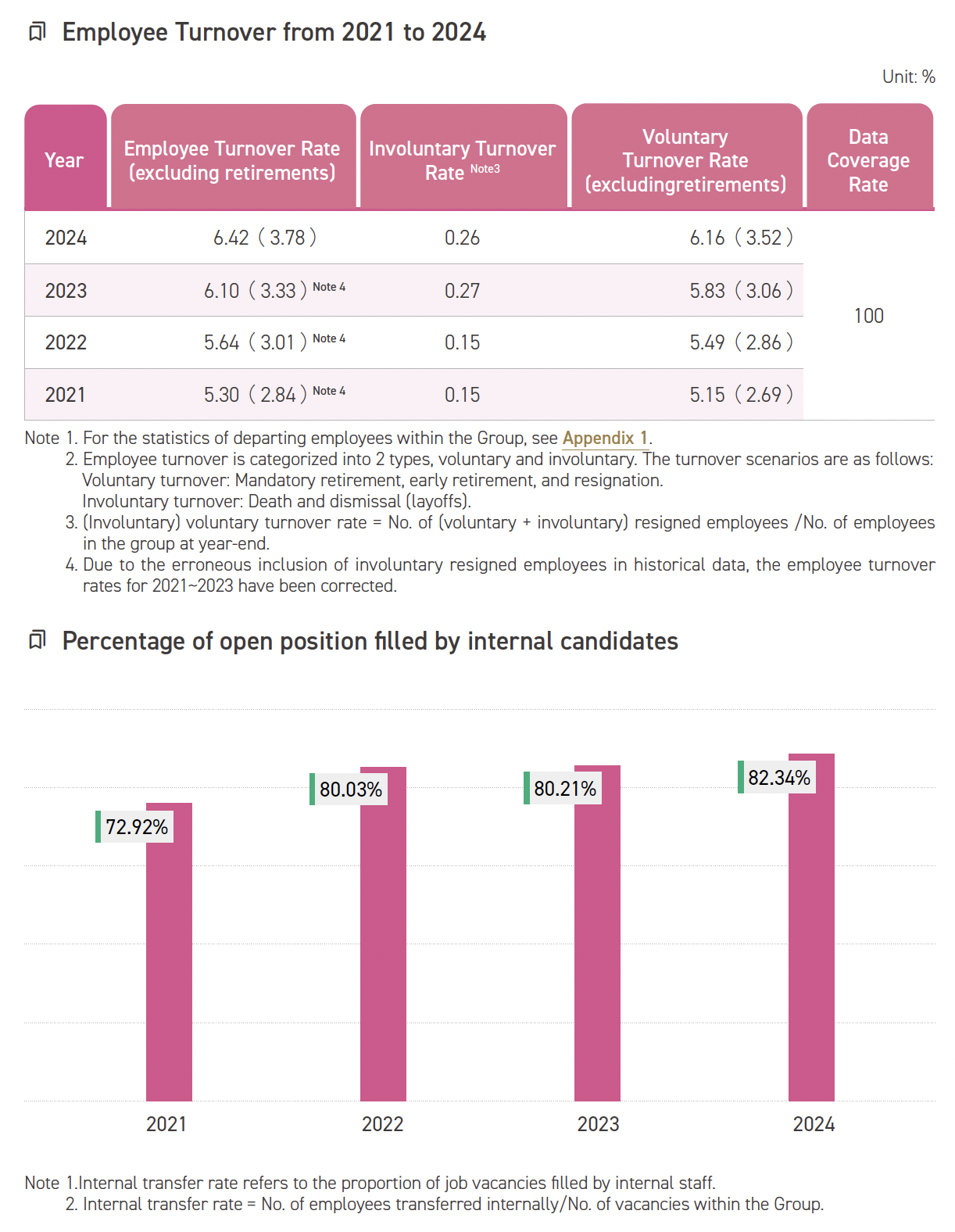
Talent Recruitment Channels
Campus Recruitment and Career Fairs
To attract potential graduates who are interested in working in the financial industry and to communicate with students directly, TCB has continued to expand campus recruitment and career fair events in recent years, inviting employees to share their experiences and introduce TCB at their alma maters to give students a better understanding of TCB’s system and culture. In 2024, TCB organized 21 campus recruitment and career fairs and 4 employment fairs at 21 universities, including National Taiwan University. The 21 career fairs were attended by approximately 2,000 university students.
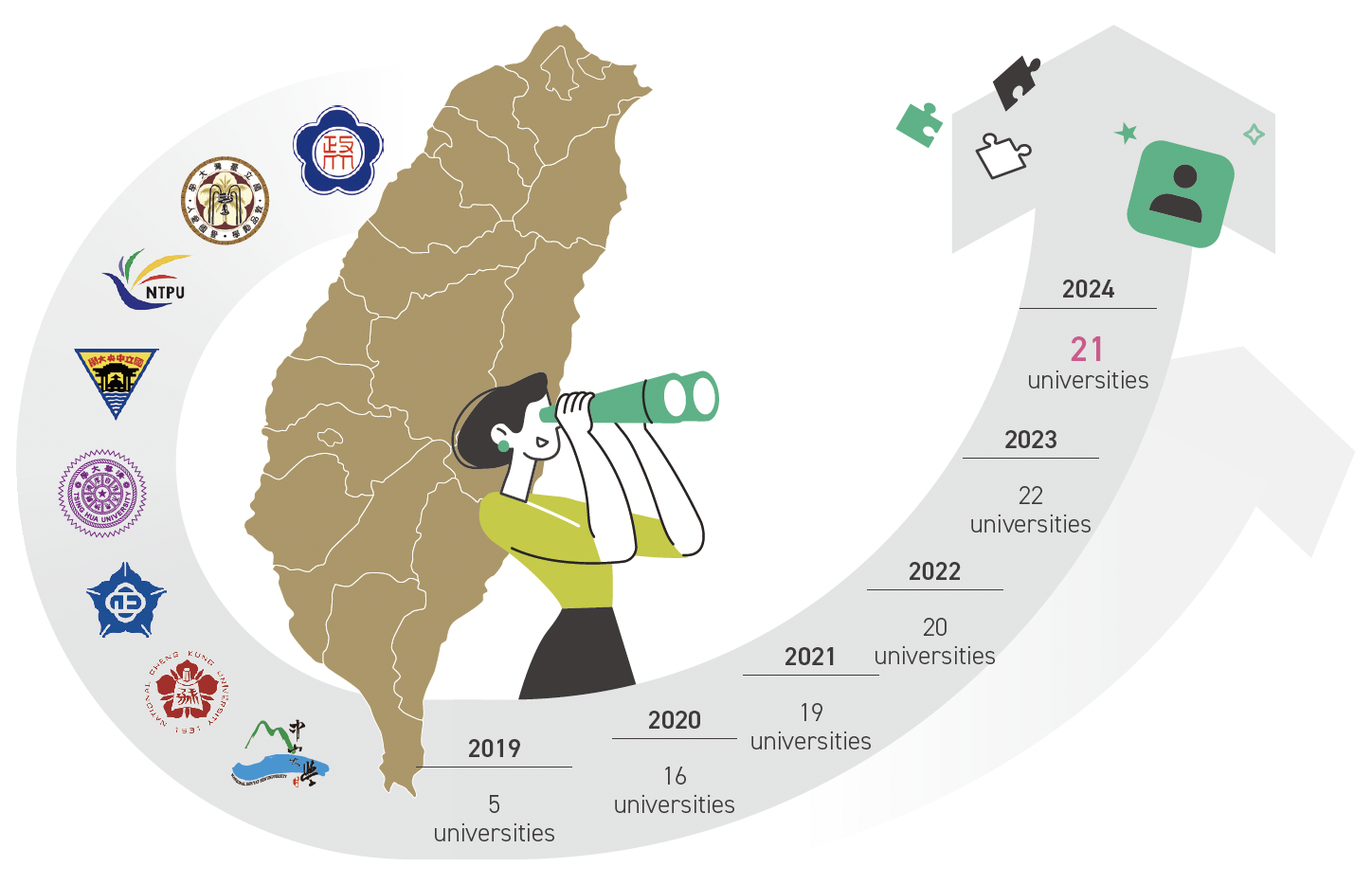
Industry-Academia Collaboration
To support local education and increase community recognition in nearby communities, TCB actively facilitates industry-academia collaborations with universities near its branches for local students to join. Since 2017, TCB has carried out collaborations with 8 universities, providing internship opportunities to students who are about to graduate. In addition to senior employees sharing practical experience working in finance, the combination of actual practices and theories helps students bridge the gap between academic theory and practical application so that they can quickly adjust to the workplace. During the internship, those who perform well and pass the interview shall be promoted to permanent employees, securing a job as soon as they graduate. In 2024, a total of 80 student interns completed the industry-university cooperation training, 40 of whom returned as full-time employees, resulting in a 50% return rate and achieving the goal of hiring local talent for operation centers and enhancing community recognition.
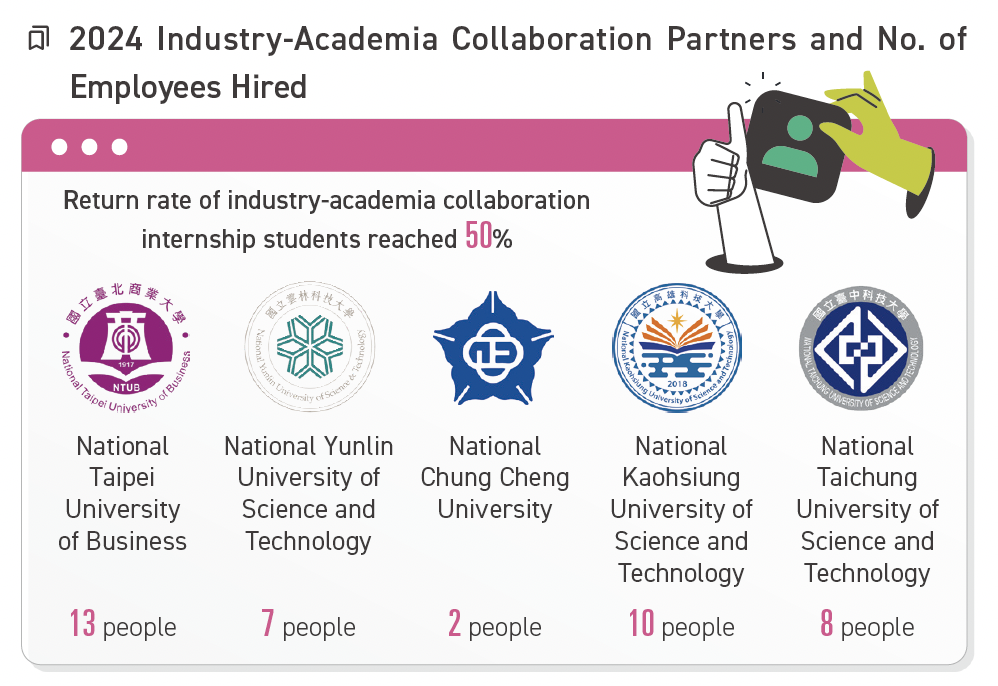
Summer Internships
With the goal of cultivating and recruiting talent, TCB provides summer internship opportunities to students of National Tsing Hua University and National Chengchi University. The 2-month internship program allows students to connect with society and industry during their academic years and strengthens the skills they need to prepare for the future and to solve problems. Panel discussions are also held at the end of the program so that TCB can get feedback from the interns and improve the internship program.
Employee Remuneration and Benefits
To create a good working environment and inspire employees’ enthusiasm and synergy, TCFHC has a comprehensive remuneration and benefit program, providing stable remuneration and multi-faceted employee benefits to better employees’ mental and physical health and create a “happy workplace”.
Remuneration Policy
TCFHC recruits new employees based on the academic background, work experience, and professional skills required for each recruitment category. It also references the salary levels of similar positions in peer institutions and publicly discloses the corresponding job grade and salary in recruitment announcements. There is no discrimination based on race, religion, skin color, political affiliation, age, gender, sexual orientation, marital status, disability, or group affiliation. On average, the starting salary for new employees each year is approximately 1.3 to 1.5 times the statutory minimum wage, clearly exceeding legal requirements. TCFHC also provides various types of leave and remuneration benefits that go beyond what is mandated by law. For continuing employees, the Company grants annual leave that exceeds legal requirements based on years of service and compensates for any unused annual leave at the end of each fiscal year.
Each year, TCFHC also grants employee bonuses and remuneration based on the Company’s overall business performance for the year. In addition, employee performance evaluations are conducted based on individual work performance, with promotions, salary adjustments, and bonus distributions implemented according to the evaluation results, thereby reflecting the operational performance and results in employees’ actual remuneration. For overseas local employees, the TCB also determines the annual salary adjustment rate and bonuses by referencing the price index and the salary levels of peers in the industry.
To strengthen the competitiveness of remuneration within the industry and boost employee morale, a comprehensive salary adjustment was implemented in 2024. TCFHC and TCB applied a general 4% salary increase, and with additional annual performance-based raises, the average salary adjustment reached 6.65%. Other subsidiaries comprehensively determinedtheir salary adjustments based on overall performance, with an average salary increase of approximately 3% to 4%. In addition, all companies within the Group provide meal allowances. In 2024, in response to the government’s income tax system optimization measures to benefit the public, the monthly meal allowance for employees was increased from NT$2,400 to NT$3,000, implemented alongside the annual salary adjustment to enhance employees’ perception of the salary increase.
In 2025, the government approved a salary increase for the military, public servants and teachers, and called on private enterprises to increase their employees' salaries. In response to the government policy, TCFHC once again approved a comprehensive salary increase for the Group in 2025, with an average increase of 2.5% to 3% for each company, so that employees can have good salaries.
Since 2015, TCFHC has been selected as a constituent in the “Taiwan High Compensation 100 Index” for 10 consecutive years, demonstrating that the Company’s salary levels are among the top tier of listed companies and have been widely recognized. In 2024, the average salary for full-time employees not holding managerial positions within the Group was NT$1.534 million, and the median salary was NT$1.452 million. In addition to substantial growth compared to the previous year, the salary levels remain among the top in the financial and insurance industry and surpass those in many other sectors. It is assessed that the annual remuneration provided by TCFHC is sufficient to meet or support the daily needs of employees and their families.
In addition, TCFHC actively implements its sustainable development policy; through the “Subsidiary Management Measures” and the “Appraisal Measures for Subsidiary Business Management”, ESG sustainability evaluation and climate risk management are appropriately linked to the remuneration of employees of the subsidiaries (including chair, CEO, and other senior managers). The implementation results of ESG material topics and major achievements (including but not limited to corporate governance, operation management, environmental protection, and corporate social responsibility) are incorporated into the operational performance evaluation of the subsidiaries as bonus points, with a view to continuing to deepen the sustainable governance of TCFHC and to implement the ultimate goal of corporate sustainable operations.

To avoid excessive gaps in overall remuneration levels, TCFHC not only regularly reviews the pay ratio between executives and general employees but also annually calculates and monitors the differences in the average and median remuneration between male and female employees, continuously tracking and observing the results, with a commitment to establishing a gender-neutral remuneration system. Using male employees as the baseline, the average salaries of male and female employees were roughly equivalent in 2024, while the median salary for male employees was approximately 7.34% lower than that of female employees. Comparing the annual bonus amounts received, the average and median bonuses for female employees were approximately 3% to 8% higher than those for male employees.
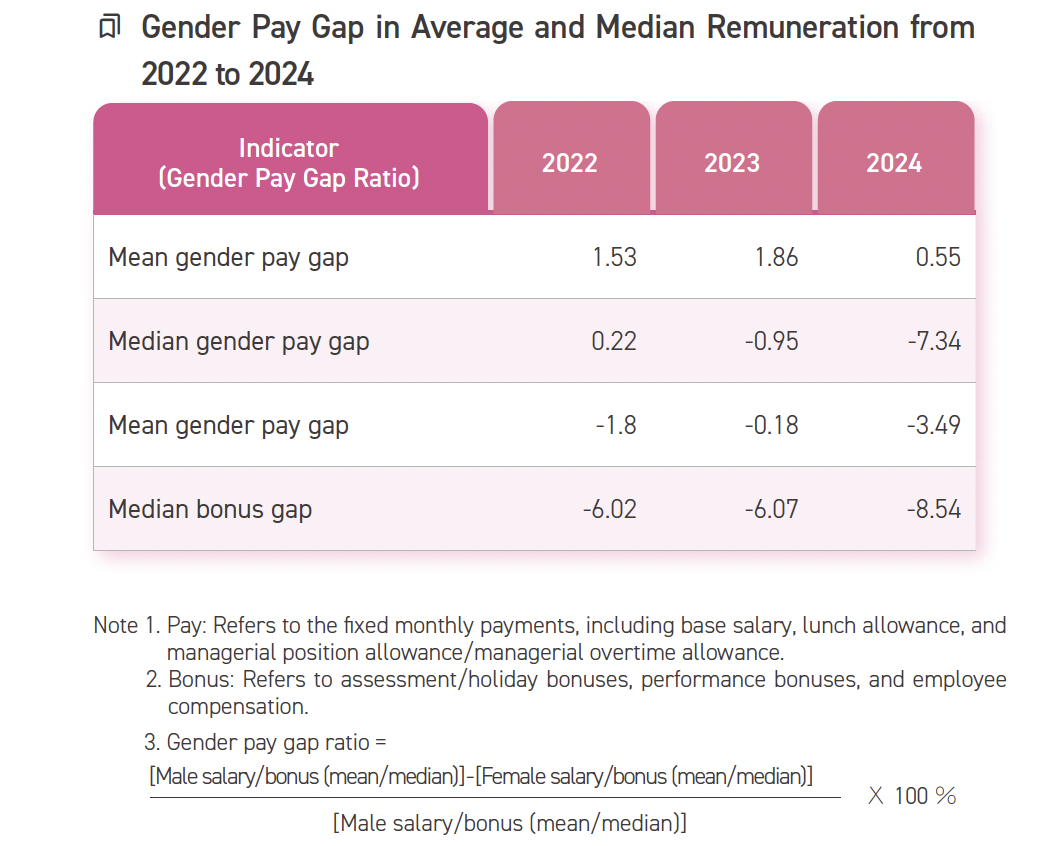
Employee Welfare
To protect the interests and rights of employees and promote employer-employee harmony, the Group also provides employee benefit measures that are superior to regulatory standards, making adjustments and additions whenever necessary. With these sound benefit measures, the Group hopes to look out for employees and fulfill its mission of taking good care of employees.
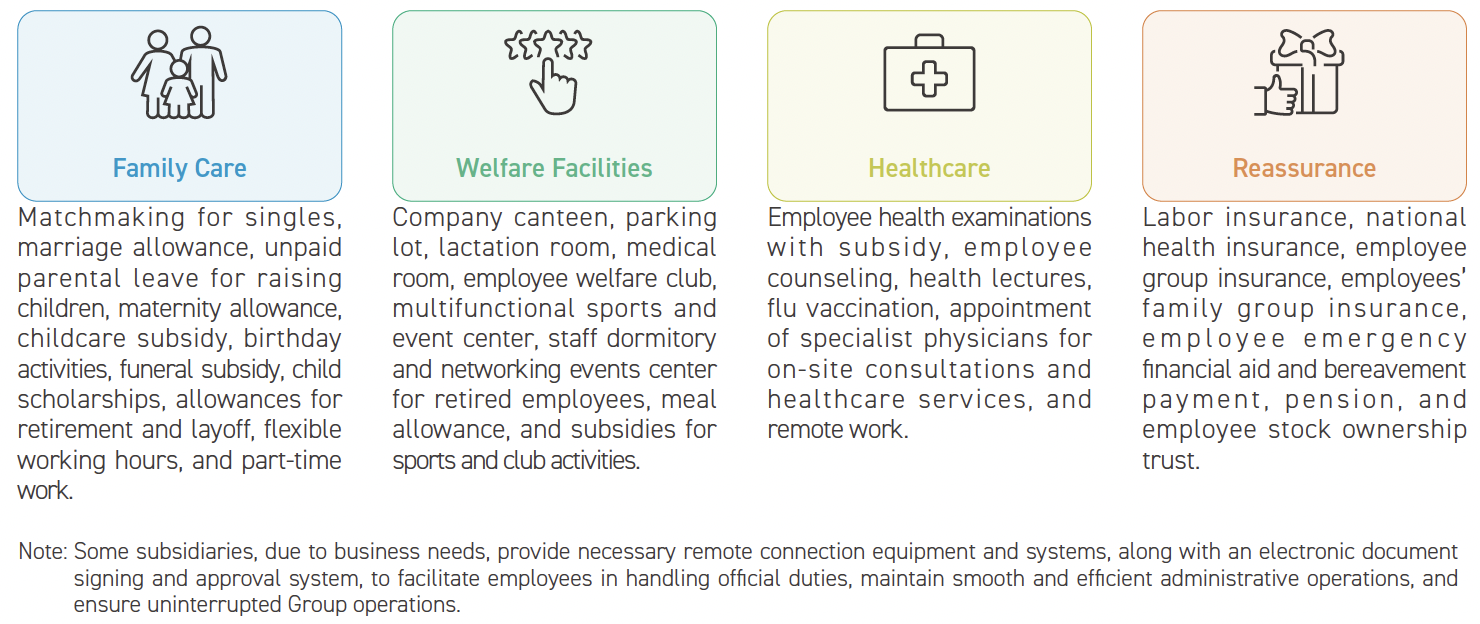
Family Care
TCFHC provides generous subsidies for marriage, childbirth, childcare, and funerals, as well as child scholarships, emergency financial aid, bereavement payments, and various comfort payments, thereby establishing comprehensive family care measures to offer employees and their families more diverse forms of support and care.
Matchmaking Events
To embed the concept of establishing a “happy enterprise” more deeply, TCB continuously organizes matchmaking events for single employees, with professional event organizers hired to plan the events in hopes that introducing more engaging activities would encourage more employees to take part, giving busy single employees a chance to expand their social circles and find their life partners, so that through the power of family stability, employees can stay and work hard at TCB stably.
Childbirth Subsidies and Childcare Services
In response to Taiwan’s aging society, declining birth rate, and the rising proportion of working women in modern society, TCFHC has significantly increased its childbirth subsidy since 2021 to allow female employees sufficient time to recuperate after childbirth and prepare for returning to the workplace. The maximum subsidy per child was raised from NT$100,000 to NT$150,000. Including the childbirth subsidy provided by the Employee Welfare Committee, each new parent can receive up to NT$160,000 per child.

For employees who meet the requirements of the “Gender Equality in Employment Act”, TCFHC will not only approve the unpaid parental leave application but also retain their job position until the leave period ends. In 2024, there were 587 employees eligible for unpaid parental leave, and a total of 117 people applied and were approved. In that year, aside from 4 of these employees who resigned voluntarily to pursue different career plans, the others were all reinstated. As a result, the reinstatement rate reached 95.74%. Among those who returned from parental leave in 2023, 93.02% remained employed for at least 1 year after their return.
TCFHC has also signed a corporate childcare service contract with Hess Educational Enterprise Co., Ltd. to provide employees with childcare support, including registration discounts, extended childcare service hours, and occasional information on campus activities, as well as parenting education consultation seminars and publications. The Employee Welfare Committee of TCB also provides childcare subsidies twice a year. For children of employees aged from 1 full year to under 5 years old, a subsidy of NT$1,000 is granted per child each time. In 2024, a total of NT$1.226 million in subsidies was provided. In addition, to encourage employees’ children to work hard at school, scholarships are awarded according to the subsidy regulations to children enrolled in government-accredited schools at all levels in Taiwan (including master’s and doctoral programs, colleges and universities, senior high schools, and the first 3 years of 5-year junior colleges following the high school standard, with the last 2 years following the college standard). The scholarship amounts range from NT$2,500 to NT$3,500. In 2024, a total of 2,615 employees applied, and NT$8.234 million in children education scholarships was awarded.

In addition to meeting the minimum requirements set by the “Labor Standards Act”, the “Regulations of Leave-Taking of Workers”, and the “Gender Equality in Employment Act”, TCFHC has further developed a comprehensive leave system that exceeds statutory requirements to enhance employee benefits. To fully protect female employees during pregnancy, the Company provides full-pay tocolysis leave prenatal leave, pregnancy checkup leave, and miscarriage leave. In cases of special circumstances requiring additional leave, employees may also apply for up to 33 days of paid personal or sick leave. After childbirth, employees are entitled to 42 working days of paid parental leave (combined with prenatal leave), equivalent to approximately 8.4 weeks. If parental leave overlaps with national holidays, it can extend up to 10 weeks. These measures aim to fully implement maternity protection policies, allowing female employees to recuperate adequately before returning to work. If needed, employees may also apply for unpaid parental leave. In addition to complying with regulations regarding breastfeeding during working hours, TCFHC has also established breastfeeding rooms at workplaces in accordance with the law. The Company continues to promote maternal care for female employees and maintain the functionality of breastfeeding rooms, being recognized with the “Taipei City Excellent Breastfeeding Room” certification for outstanding performance.
To ensure that employees can enjoy family life beyond work, male employees may apply for full-pay pregnancy checkup accompaniment leave and parental leave before and after their spouse’s childbirth, allowing them to accompany their partner throughout the pregnancy. In addition, after their spouse gives birth, employees may also take 7 days of full-pay family care leave to care for their child, or apply for a longer period of parental leave if needed(1 month~to 2 years).
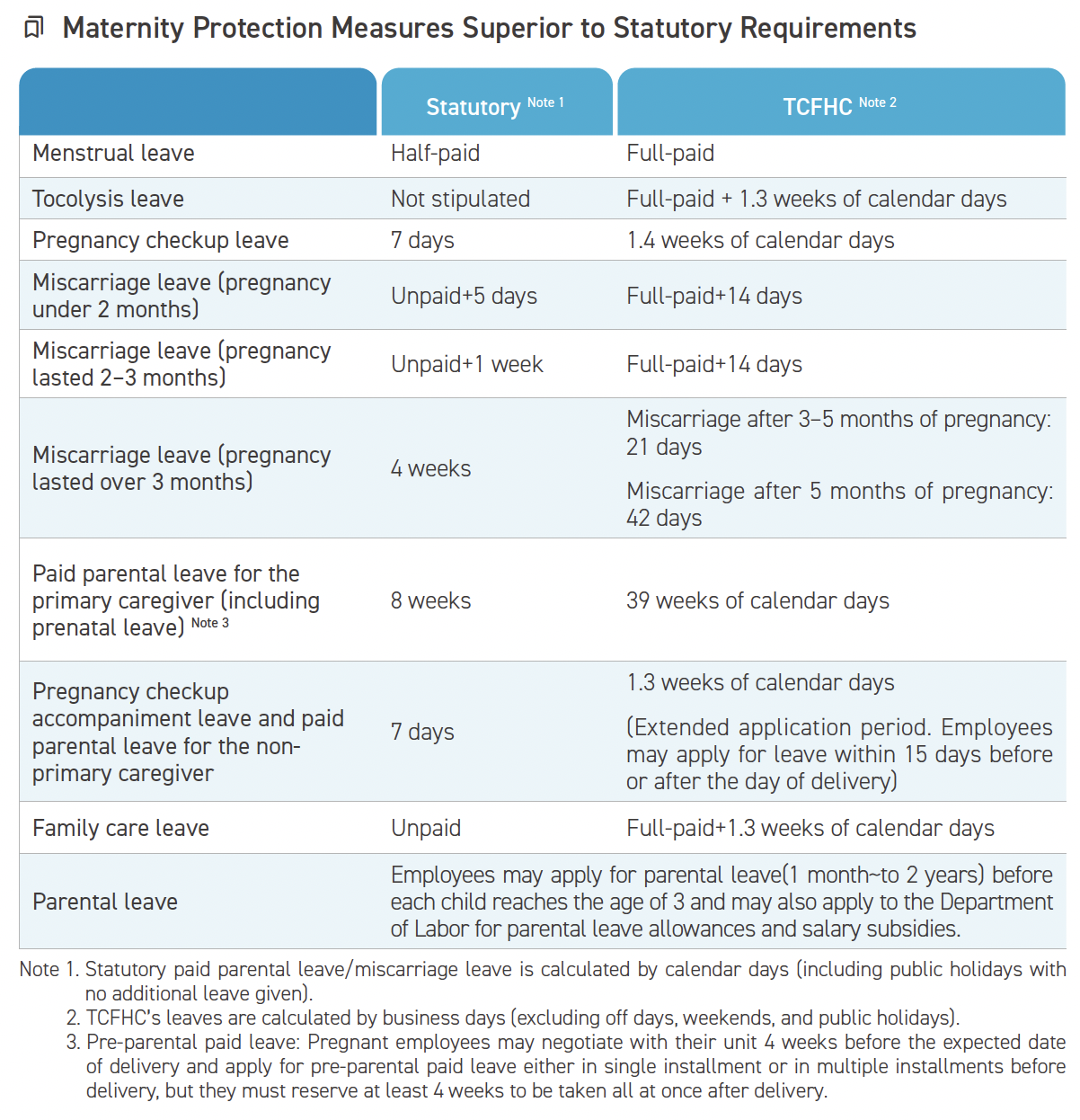
Flexible Working Hours and Part-Time Work
If employees have needs (such as raising a child under the age of 3), they may apply not only for parental leave but also, in accordance with work rules, request a reduction of 1 hour in their daily working hours from the company. In addition, due to the nature of their business, some subsidiaries allow employees to apply for flexible working hours from the company in accordance with work rules, enabling adjustments to their start and end times. If an employee applies for part-time work, the company may agree to the colleague's part-time work if it does not conflict with the company's interests, and some subsidiaries may hire part-time employees for a long term due to business needs.
Welfare Facilities
TCFHC Group has been concerned with the health of employees, striving to create a happy workplace, an effort that has propelled each subsidiary and its branches to set up facilities based on office size and the needs of employees, such as medical rooms, lactation rooms, employee clubs, company canteens, and parking lots.
There are multi-functional courts, gyms, and yoga and dance classrooms in the Activity Center of the TCB head office. Employees can form teams to play basketball, badminton, and other ball sports, or take aerobic, yoga, dance, and other lessons, and hire professional coaches to teach. To encourage employees to participate in club activities after work, eliminate work-related stress, and enhance exchange and interaction, starting from 2020, any clubs registered and established according to the “Guidelines for the Management of TCB Employee Clubs” can apply for subsidies for expenses generated from club-related activities. As of the end of 2024, a total of 15 clubs have been registered, with a total subsidy amount of NT$391,000.
Healthcare
In order to enhance employees’ awareness of self-managed health and timely prevention or treatment, TCFHC commissions a professional medical examination agency to conduct comprehensive health examinations for employees at all units every 3 years. Additionally, we provide subsidies for employees to undergo health examinations at their own expense and offer extra subsidies for specific items, aiming to prioritize prevention over treatment.
In addition, apart from BNP TCB Life inviting doctors to provide on-site flu vaccinations for employees as a regular practice, TCB held 2 sessions of a “Workplace Flu Vaccination Station for Government-Funded and Self-Paid Vaccines”, where employees could also receive the COVID-19 JN.1 vaccine on the same day. TCS also coordinated with TCB to hold the same event on the same day, while other subsidiaries provided subsidies for employees to receive flu vaccinations at their own expense. This initiative aims to encourage employees to actively get vaccinated and strengthen their immunity.
Since 2020, TCB has participated in the “Corporate Epidemic Prevention Alliance” certification by the Taiwan Immunization Vision and Strategy (TIVS). In addition to receiving the Silver Award in 2020, TCB has consecutively won the “Epidemic Prevention Vanguard Gold Award” from 2021 to 2024. Furthermore, TCS also received the “Epidemic Prevention Vanguard Gold Award” in 2024.
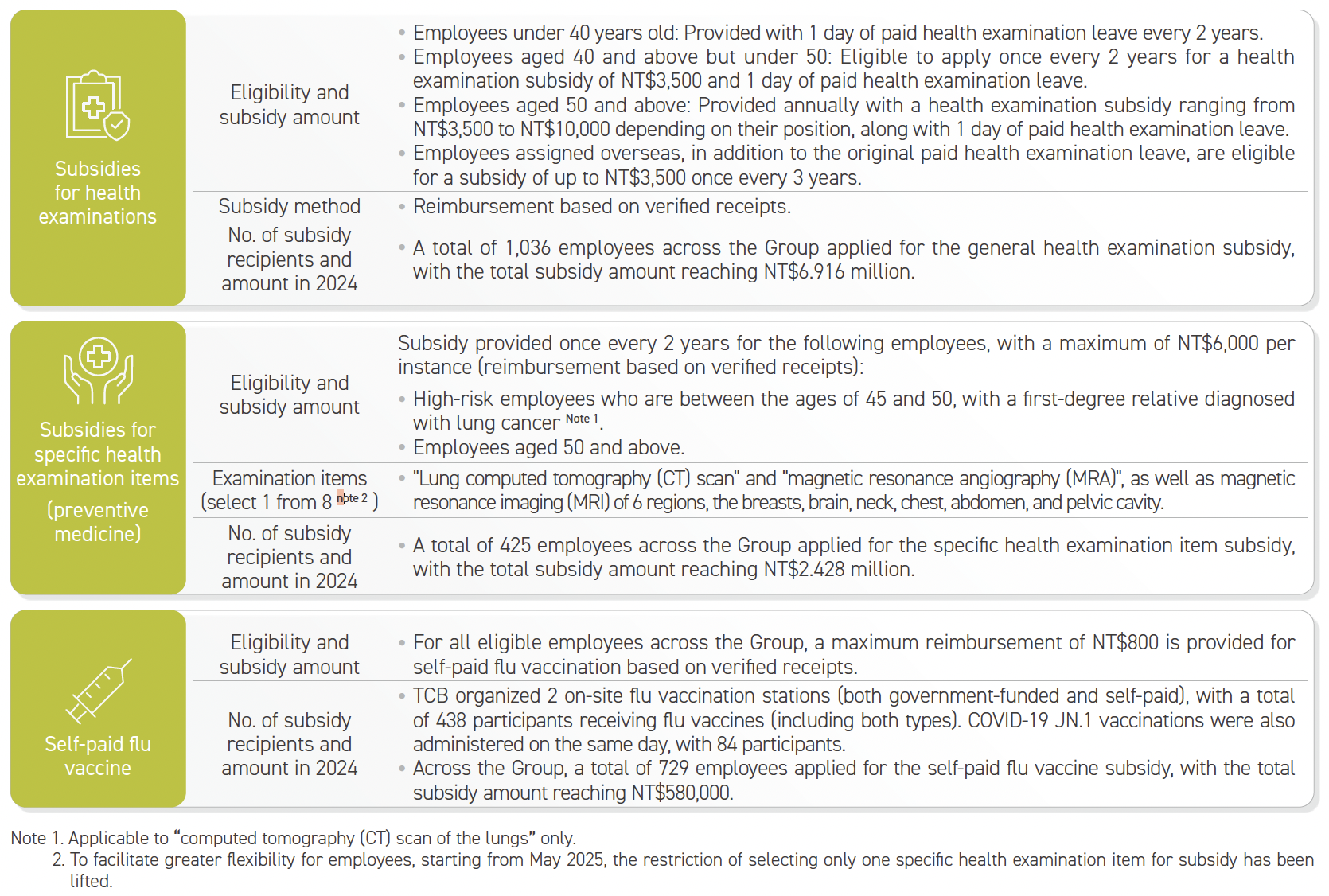
TCB analyzed the age distribution and health examination results of employees across all units and organized seminars focusing on dietary control, with total training hours reached to 17,495 hours. An 11-week “TCFHC LOHAS Weight Management Program” was subsequently held to promote smart eating and joyful exercise among employees. Through dietary control and regular exercise, a total weight loss of 210.7 kilograms was achieved.
In addition to providing an excellent maternity subsidy program, TCFHC continues to promote maternal care for female employees. For female employees who are pregnant or within 1 year postpartum, the occupational health and safety supervisor conducts environmental risk assessments. Through on-site health services, physicians assess the employees’ work and physical conditions, provide risk evaluations, and offer educational materials related to pregnancy. In 2024, a total of 24 employees received care and counseling.
All subsidiaries of the Group have obtained the “Badge of Accredited Healthy Workplace: -Health Promotion” issued by the Health Promotion Administration. In addition, to actively promote employee health, TCB has implemented a phased plan in 2024 to guide 248 business locations in promoting various health initiatives, including correct sitting posture, healthy eating, chronic disease prevention, and mindfulness-based stress reduction. To help alleviate employees’ work-related stress, we regularly hold physical and mental health promotion courses, with professional psychological counselors or psychiatrists providing instruction on stress relief and mindfulness techniques. A “List of Mental Health Services Provided by TCB or Available in Taiwan” is also available for employees with counseling needs to utilize multiple therapy channels. We also regularly publish Occupational Safety and Health Academy literature to promote the importance of physical and mental health balance and to help employees become more attuned to the physical and mental health of their fellow colleagues.
BNP TCB Life began introducing the employee assistance program (EAP) in 2017, helping employees relieve work-related stress and handle problems at work and in life. The program provides comprehensive physical and mental balance as well as psychological counseling services through phone calls, letters, or face-to-face consultations, helping employees achieve work-life balance. Topics of consultation include parent-child communication, affection and relationships, family and partner issues, and pressure from work. In 2024, an average of 3 employees utilized these services each month.
Reassurance
In order to protect employees’ lives and work against uncertainty, TCFHC has enrolled its employees in labor insurance, national health insurance, and employee group accidental injury insurance to ensure that each employee is provided with the care they deserve during their duty hours. Employees’ dependents are also entitled to join the group insurance. Employee retirement or dismissal is handled in accordance with the “Employee Retirement, Casualty and Severance Regulations”, and relevant subsidies are also provided by the Employee Welfare Committee.
As for post-retirement life, TCFHC has set up an employee retirement system according to the “Labor Standards Act” and the “Labor Pension Act”, under which TCFHC makes monthly contributions equivalent to 6% of each employee’s insured monthly salary as the labor pension to provide security for employees’ retired lives. In addition, TCB has also set up a retiree networking center as a venue for retirees to meet and interact with each other.
To improve its competitive edge, increase employees’ willingness to work long-term at the company, and assist employees in accumulating future wealth and retirement financial planning, TCB established an employee stock ownership trust in 2020. Full-time employees who have stayed at the company for more than 6 months can opt to participate in the stock ownership trust. For participants, TCB allocates NT$1,000 of stock subscription (company contributions) to encourage employees (including senior-level managerial employees) to invest in the company’s stocks through a systematic investment plan. This not only allows employees to share the fruits of the company as shareholders, but also has the effect of additional salary. Employees can get back the full amount of personal contributions when they leave or retire, while company contributions will be given based on employees’ membership years, aiming to strengthen talent retention and reduce turnover rates.
Since the launch of the employee stock ownership trust, TCB has maintained an employee participation rate exceeding 90%, demonstrating excellent execution results. To further strengthen employee cohesion and enhance the Group’s operational performance, starting in 2024, TCFHC and other subsidiaries have also fully implemented the program under the same conditions. This initiative enables employees to begin financial planning for retirement early and helps secure their retirement life.
